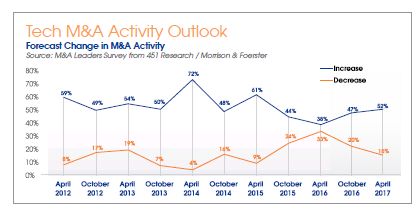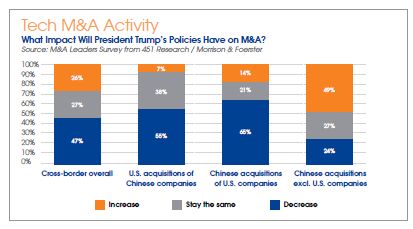
The survey follows a relative slowdown in the number of deals during the first quarter of the year, though there was an increase in aggregate value. According to 451 Research's M&A KnowledgeBase, there were 912 deals with an aggregate value of USD 77 billion in Q1 2017, compared to 1,065 deals with an aggregate value of $74 billion in Q1 2016. However, 2017 comes after two years of the highest tech M&A spending since the Internet bubble burst. Collectively, acquirers in 2015 and 2016 announced deals valued at more than USD 1 trillion, according to the M&A KnowledgeBase.
"The survey forecast represents the most bullish outlook in two years," said Robert Townsend, co-chair of Morrison & Foerster's Global M&A Practice Group. "The slight slowdown in Q1 activity is almost entirely attributable to less shopping by corporate acquirers. Still, we are encouraged by the optimism around tech M&A in the U.S. for the rest of the year."
Other key findings, takeaways, and analysis from the M&A Leaders' Survey include the following:
Financial Acquirers Key to Overall Market Activity
Survey respondents expect that financial buyers – the rivals to tech vendors for many targets – will play a major role in overall market activity. That was true for this year (with 54 per cent forecasting an increase in private equity activity compared with 2016) and even more so when the timeline was extended out to 2020 (with 59 per cent anticipating an increase in PE activity compared with 2016).PE firms are expected to focus on a mix of old and new M&A strategies, according to the survey. Respondents predicted that "bolt-on acquisitions" would see the largest increase in activity from buyout shops through 2020, which is unsurprising given that buyout shops typically acquire two or three times as many bolt-ons as platforms in any given year, and they usually involve smaller, less-risky transactions. However, the survey respondents' second-ranked strategy of recapitalising venture capital-backed startups comes as a relatively novel driver of PE activity. Up until now, there have not been many of those types of transactions, but as companies inside venture portfolios continue to age beyond the 8- to 10-year holding period for most VC firms, the startups may seek new backers. The demographics of the startup ecosystem appear to support this trend.
Cross-Border M&A to See Change
Part of what will help M&A accelerate this year, at least in the view of a plurality of survey respondents, is the new administration in the United States. Four out of ten (41 per cent) forecast that President Trump's future economic policies will stimulate dealmaking, almost twice the 22 per cent who said his policies will slow M&A.
Conversely, M&A between the two largest economies in the world, the United States and China, is expected to be particularly difficult in the coming years.
Two-thirds of survey respondents (65 per cent) predicted that Chinese acquirers will slow their purchases of U.S. tech companies, more than four times the 14 per cent that said the opposite. Similarly, more than half (55 per cent) of the survey respondents said U.S. companies will do fewer tech deals in China. That sentiment is already coming through in the actual deal flow, where Chinese acquirers of Chinese tech assets have outnumbered U.S. buyers of Chinese tech assets three to one, according to 451 Research's M&A KnowledgeBase. Still, 49 per cent of survey respondents expect an increase in acquisitions by Chinese companies in countries other than the United States.
Find out more about the survey results here.
About the M&A Leaders Survey
The survey – a partnership project between Morrison & Foerster and tech market intelligence firm 451 Research now in its 11th edition – examines significant developments in deal terms, as well as sentiments and trends in key technology markets across the United States and the most active countries and regions internationally. This survey was conducted in April 2017 and had over 150 participants, primarily corporate or M&A executives (44 per cent of respondents) and investment bankers (42 per cent of respondents), with the remaining responses coming from lawyers, VCs, PE professionals, and others in the M&A community. Roughly 9 out of 10 responses came from dealmakers and advisers based in the United States; Silicon Valley represented the largest single location, accounting for some 40 per cent of the total.
NOTEWORTHY DEALS
Below we highlight for you some of the noteworthy transactions involving Europe that may provide you with valuable insights into recent trends or developments.HNA to assume control of storage business of Glencore UK
Chinese conglomerate HNA Group Co. Ltd. reached an agreement with Glencore plc, a listed company on the London Stock Exchange, to acquire 51 per cent of its petroleum products, as well as the storage and logistics business of Glencore. With said acquisition, HNA will assume control. The transaction, valued at USD 775 million, provides for the formation of a new company, HG Storage International, in which the operation of oil storage assets in Europe, Africa and the Americas will be combined. The deal is expected to close in the second half of 2017.Georgsmarienhütte Holding to separate from railway business
Georgsmarienhütte Holding GmbH, a German-based group, agreed to sell its railway system business, including the subsidiaries in Bochum, Ilsenburg, and Brand-Erbisdorf, Germany, as well as one subsidiary in Brazil, to a Chinese investor consortium led by Full Hill Enterprises Ltd. The parties agreed not to disclose any details of the transaction, which was closed in March 2017.A cross-office team of MoFo acted as lead counsel to the purchaser, including attorneys from the Hong Kong and Berlin offices.
Clariant to merge with U.S. competitor Huntsman
Clariant, a Swiss-based chemical company listed on the Swiss Stock Exchange, reached an agreement with its U.S. competitor Huntsman, a Texas-based NYSE-listed company, for a merger of equals, creating a leading global specialty chemical company. The merged company, with the new name "HuntsmanClariant", is considered to have sales of approximately USD 13.2 billion and an EBITDA of approximately USD 2.3 billion. The merged company will have its legal seat in Switzerland but will be managed from The Woodlands, Texas. The transaction provides for a 52 per cent stake of the Clariant shareholders and a 48 per cent stake of the Huntsman shareholders.Merger of Deutsche Börse and London Stock Exchange blocked by EU competition authority
Merger plans by Deutsche Börse AG and the London Stock Exchange to create a unified major stock exchange operator in Europe were finally blocked by the EU competition authority, the Competition Directorate General of the European Commission. During regulatory scrutiny, the authority required the LSE to divest its holdings in MTS, an Italy-based electronic trading platform for government bonds, making such divestment a condition for approval. Due to the LSE's declaration of intent not to comply with such requirement, the EU competition authority had to block the transaction one day after Britain formally triggered Article 50 proceedings. The transaction attracted much attention, since both parties had pledged to continue and had given assurance that they would close the transaction despite the Brexit vote. The blocked merger deal is the third failed attempt at a merger between the two companies.GE to invest in 3D printing company
NYSE-listed company General Electric acquired Concept Laser, a leading provider of machine and plant technology for 3D printing of metal components based in Lichtenfels, Germany. With the acquisition of Swedish Arcam, GE becomes the world's market leader in industrial 3D metal printing. GE plans to invest approximately EUR 100 million in the site in Lichtenfels, and there are also rumors that GE might locate the worldwide seat of its newly formed division GE Additive in Lichtenfels. Sales of Concept Laser most recently amounted to up to 400 units with a return of approximately EUR 91 million.Japanese Nidec acquires manufacturer of special compressor for refrigerating and freezing appliances
Nidec Corporation, a Kyoto-based corporation listed on the Nikkei, reached an agreement with Aurelius Equity Opportunities, a capital investment company based in Germany, for the sale of the SECOP Group, a leading manufacturer of compressors in refrigerating and freezing appliances. The deal has a volume of EUR 185 million, making it the largest company sale in the seller's history, earning approximately 11 times its invested capital after seven years. The sale will have a positive effect on Aurelius' group profit of approximately EUR 100 million, according to a company press release. The transaction is pending regulatory approval and closing is expected in the coming months.Chinese investment group to invest in German biotech company
Chinese investment group Creat reached an agreement for the takeover of Biotest, a Frankfurt Stock Exchange-listed biotech company operating in the field of plasma protein products. The major shareholder of Biotest, the founding family of Schleussner, agreed to sell its 51 per cent stake in Biotest. Including debts, accruals, and cash balance, Creat agreed to pay approximately EUR 1.3 billion. The deal provides for a payment of EUR 28.50 per ordinary share and EUR 19 per preferred share. The takeover of Biotest follows the purchase of UK-based Bio Products last year with a volume of GBP 820 million.Bosch to sell its starter motor business to Chinese investor consortium
German automotive supplier Bosch entered into an agreement for the sale of its starter motor division that includes 16 sites in 14 countries. The purchaser is Zhengzhou Coal Mining Machinery Group, a manufacturer of machines used in coal mining and of automotive parts, and China Renaissance Capital investment, a Hong Kong-based private equity company managing a fund worth up to USD 2 billion. All parties agreed to non-disclosure of any details of the transaction, but the deal is considered to involve a cash payment of EUR 545 million. The transaction is still pending regulatory approval.Cathay Fortune to acquire medical engineering specialist Epigenomics
Hong Kong-based investment company Cathay Fortune offered shareholders of Epigenomics, a medical engineering specialist company based in Frankfurt, EUR 7.52 per share in cash, totaling EUR 171 million.The offer price exceeds by almost 50 per cent the average share price of the last three months. Founded in 1998 and listed in the Prime Standard of the Frankfurt Stock Exchange, Epigenomics specialises in molecular diagnostics and develops blood tests for colorectal cancer pre-diagnostics. Cathay Fortune uses an acquisition vehicle with the name Summit Hero in which the major shareholder of Epigenomics, the Chinese diagnostics company Biochain, also holds a stake via an exchange of its stakes in Epigenomics. The takeover offer is currently under scrutiny by the German securities exchange authority, BaFin.
Chinese automotive supplier to acquire a stake in Grammer
Chinese automotive supplier Ningbo Jifeng acquired convertible bonds in Grammer, a manufacturer of headrests, armrests, and car seats based in Amberg, Germany, worth up to EUR 60 million, pursuant to which Jifeng is entitled to approximately 9.2 per cent of the shares in Grammer. With said stakeholding, Jifeng seeks strategic alliances with Grammer. The acquisition is an important step in fending off a feared cold takeover: Grammer faces pressure from Prevent Group, owned by the Bosnian investor family Hastor, who seeks to replace the management of Grammer with managers of the group, alleging misconduct and statutory violations by the current management.Prevent Group attracted attention last year after a dispute with Volkswagen, which led to a temporary breakdown of production in Wolfsburg.
No comments:
Post a Comment